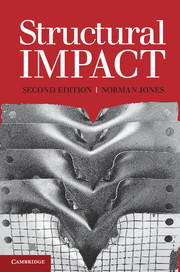Book contents
- Frontmatter
- Contents
- Preface to the Second Edition
- Preface to the First Edition
- Structural Impact
- 1 Static Plastic Behaviour of Beams
- 2 Static Plastic Behaviour of Plates and Shells
- 3 Dynamic Plastic Behaviour of Beams
- 4 Dynamic Plastic Behaviour of Plates
- 5 Dynamic Plastic Behaviour of Shells
- 6 Influence of Transverse Shear and Rotatory Inertia
- 7 Influence of Finite Displacements
- 8 Strain-Rate-Sensitive Behaviour of Materials
- 9 Dynamic Progressive Buckling
- 10 Dynamic Plastic Buckling
- 11 Scaling Laws
- Appendix 1 Principle of Virtual Work
- Appendix 2 Path-Dependence of an Inelastic Material
- Appendix 3 Principle of Virtual Velocities
- Appendix 4 Consistent Sets of Equilibrium Equations and Geometrical Relations
- Appendix 5 Buckingham Π-Theorem
- Appendix 6 Quasi-Static Behaviour
- Appendix 7 Martin’s Upper Bound Displacement Theorem
- References
- Answers to Selected Problems
- Author Index
- Subject Index
10 - Dynamic Plastic Buckling
Published online by Cambridge University Press: 05 June 2012
- Frontmatter
- Contents
- Preface to the Second Edition
- Preface to the First Edition
- Structural Impact
- 1 Static Plastic Behaviour of Beams
- 2 Static Plastic Behaviour of Plates and Shells
- 3 Dynamic Plastic Behaviour of Beams
- 4 Dynamic Plastic Behaviour of Plates
- 5 Dynamic Plastic Behaviour of Shells
- 6 Influence of Transverse Shear and Rotatory Inertia
- 7 Influence of Finite Displacements
- 8 Strain-Rate-Sensitive Behaviour of Materials
- 9 Dynamic Progressive Buckling
- 10 Dynamic Plastic Buckling
- 11 Scaling Laws
- Appendix 1 Principle of Virtual Work
- Appendix 2 Path-Dependence of an Inelastic Material
- Appendix 3 Principle of Virtual Velocities
- Appendix 4 Consistent Sets of Equilibrium Equations and Geometrical Relations
- Appendix 5 Buckingham Π-Theorem
- Appendix 6 Quasi-Static Behaviour
- Appendix 7 Martin’s Upper Bound Displacement Theorem
- References
- Answers to Selected Problems
- Author Index
- Subject Index
Summary
Introduction
The dynamic plastic progressive buckling of thin-walled tubes subjected to axial impact loads was examined in Chapter 9. The impact loads were applied sufficiently slowly so that neither the axial nor the lateral inertia effects of the tubes played a significant role during the response. The duration of the impact loading was much longer than the transit time of an elastic stress wave which propagates along the length of a tube, as shown in § 9.8.3. A tube was unable, therefore, to support a mean dynamic axial load which was larger than the corresponding static value when disregarding the influence of material strain rate sensitivity examined in Chapter 8. Thus, the deformed profile of a tube is similar in this case for both static buckling and dynamic progressive buckling and a quasi-static theoretical analysis gave satisfactory agreement with the corresponding experimental results, as discussed in Chapter 9.
If a thin-walled tube, or other structural member, is subjected to a sufficiently severe dynamic axial load, then structural inertia effects produce the phenomenon of dynamic plastic buckling. In this circumstance, the deformed shape of the structure may be quite different from the corresponding progressive buckling profile, as illustrated in Figure 10.1 for an axially loaded circular tube. The shell is wrinkled over the entire length when buckled dynamically, unlike the dynamic progressive buckling case with wrinkling confined to one end. This situation should be contrasted with Figure 10.2, which shows the dynamic plastic buckling of a rod subjected to an axial impact load. The wrinkling is confined to the impacted end in this case, whereas a lateral deformation profile with a low mode number would be likely to develop over the entire length for static axial loads.
- Type
- Chapter
- Information
- Structural Impact , pp. 425 - 478Publisher: Cambridge University PressPrint publication year: 2011



